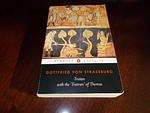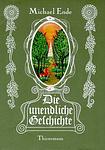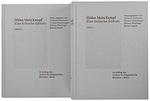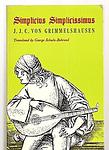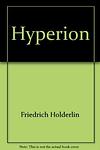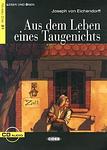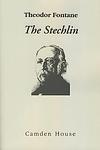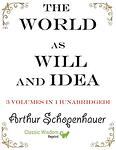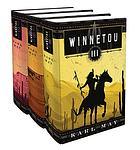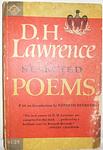The Greatest German Books of All Time
Click to learn how this list is calculated.
This list represents a comprehensive and trusted collection of the greatest books. Developed through a specialized algorithm, it brings together 300 'best of' book lists to form a definitive guide to the world's most acclaimed books. For those interested in how these books are chosen, additional details can be found on the rankings page.
Genres
Countries
Date Range
Reading Statistics
Click the button below to see how many of these books you've read!
Download
If you're interested in downloading this list as a CSV file for use in a spreadsheet application, you can easily do so by clicking the button below. Please note that to ensure a manageable file size and faster download, the CSV will include details for only the first 500 books.
Download-
26. The Nibelungenlied by Anonymous
"The Nibelungenlied" is a Middle High German epic poem that narrates the story of dragon-slayer Siegfried at the court of the Burgundians, his murder, his wife Kriemhild's revenge, and the destruction of the Burgundians. The narrative is set in the early medieval period and combines elements of Norse mythology, courtly love, and heroic legend. The poem explores themes of honor, loyalty, love, betrayal, and revenge, and is considered one of the most important works of German literature.
-
27. Anniversaries by Uwe Johnson
"Anniversaries" is a novel that provides a detailed account of a year in the life of Gesine Cresspahl, a German immigrant living in New York City with her young daughter. The narrative unfolds through daily entries, spanning from August 1967 to August 1968, intertwining the protagonist's present-day experiences with her traumatic past in Nazi and post-war East Germany. The novel explores themes of memory, identity, displacement, and the complexities of history, offering a nuanced perspective on the immigrant experience and the lasting impacts of historical trauma.
-
28. On the Genealogy of Morality by Friedrich Nietzsche
This philosophical work is a critical exploration of the origins and development of moral values. The author challenges conventional notions of good and evil, arguing that they evolved not from any inherent sense of justice, but rather as a means of exerting control over society. He presents a historical analysis of how morality has been used as a tool by the powerful to dominate the weak, and critiques the influence of religion and societal norms on our understanding of morality. The book is a profound examination of the nature of morality, its origins, and its impact on human behavior.
-
29. The Reader by Bernhard Schlink
"The Reader" is a poignant narrative centered around a young German boy's complex relationship with an older woman, who later turns out to be a former Auschwitz guard. Their relationship begins with her teaching him to read, but takes a drastic turn when she disappears, only to reemerge on trial for war crimes. The novel explores themes of guilt, shame, and redemption, as the boy, now a law student, grapples with his feelings for a woman he once loved, but whose past actions he cannot reconcile with.
-
30. Being and Time by Martin Heidegger
Being and Time is a seminal work that explores the concept of "being" through a detailed analysis of human existence. The book delves into existential and phenomenological thought, examining how humans relate to the world and their own existence. The author argues that people are always "being-in-the-world" and that understanding this fundamental state is crucial to comprehending the broader concept of being. The work also introduces the concept of "Dasein," a term used to describe the specific type of being that humans possess.
-
31. Wilhelm Meister's Apprenticeship by Johann Wolfgang von Goethe
"Wilhelm Meister's Apprenticeship" is a classic coming-of-age story that follows the protagonist, Wilhelm, through his journey of self-discovery. Caught between his bourgeois background and his aspirations to become an actor, Wilhelm embarks on an odyssey that introduces him to a variety of characters and experiences. The novel explores themes of love, loss, and the pursuit of artistic excellence, while also critiquing the social norms and expectations of the time.
-
32. Tristan by Gottfried von Strassburg
"Tristan" is a medieval romance that tells the tragic tale of the noble knight Tristan and the beautiful princess Isolde. The story is filled with themes of love, betrayal, and honor, as Tristan is sent to Ireland to bring back Isolde for his uncle, King Mark, to marry. However, on their journey back, they accidentally consume a love potion, causing them to fall deeply in love with each other. Their illicit affair eventually leads to their downfall, resulting in a tale filled with sorrow and heartbreak.
-
33. Economy and Society by Max Weber
"Economy and Society" is a comprehensive analysis of the relationship between economy and society, focusing on the role of social actions and their impact on economic systems. The book presents a theoretical framework for understanding how economic and social structures influence each other, including the role of bureaucracy, power, and authority. The author also introduces his famous concept of the "Protestant Ethic", linking the rise of capitalism to certain aspects of Christian beliefs. The book is considered a fundamental text in sociology and economics, providing a deep understanding of social and economic phenomena.
-
34. Eichmann in Jerusalem: A Report on the Banality of Evil by Hannah Arendt
This book is a thought-provoking exploration of the trial of Adolf Eichmann, a major organizer of the Holocaust. The author argues that Eichmann was not a fanatical ideologue, but rather an ordinary individual who simply followed orders and bureaucratic procedures, highlighting the terrifying potential for evil in any system that values obedience over personal responsibility. The concept of the "banality of evil" is introduced, suggesting that horrific acts can be committed by ordinary people under certain conditions.
-
35. The Neverending Story by Michael Ende
"The Neverending Story" is a captivating fantasy novel that follows the adventures of a young boy named Bastian. When he stumbles upon a mysterious book, he becomes engrossed in the magical world of Fantastica, where he must embark on a perilous quest to save the realm from destruction. As Bastian's imagination intertwines with reality, he discovers the power of storytelling and the importance of believing in oneself. This enchanting tale explores themes of courage, friendship, and the boundless nature of imagination.
-
36. The Rings of Saturn by W. G. Sebald
"The Rings of Saturn" is a richly detailed travelogue that follows the narrator's journey along the coast of Suffolk, England. The narrative weaves together history, literature, and personal anecdotes, exploring topics as diverse as the decline of the herring industry, the horrors of colonialism in the Congo, and the life of philosopher Sir Thomas Browne. The book is characterized by its melancholic tone, its digressive style, and its meditative reflections on memory, time, and decay.
-
37. Mein Kampf by Adolf Hitler
This book is a two-volume work written by a prominent dictator during his imprisonment in 1924. It outlines his political ideology and future plans for Germany, combining elements of autobiography with an exposition of his views on race, nationality, and governance. The author's main thesis is that the German-speaking 'Aryan' race is superior to all others, and that it is the duty of the state to preserve the purity of this race through policies of racial segregation, expansionism, and extermination. The book also contains detailed discussions on the author's hatred towards Jews, Marxism, and the parliamentary system.
-
38. Beyond Good and Evil by Friedrich Nietzsche
"Beyond Good and Evil" is a philosophical work that challenges the moral conventions of the time, arguing that concepts of good and evil are not absolute but are instead social constructs. The book delves into the nature of individual morality, asserting that it is driven by self-interest and the will to power. It also criticizes past philosophers for their unquestioning acceptance of religious and societal norms, and promotes the idea of the "overman" or "superman", a superior human who embraces his instincts and creates his own values.
-
39. The Lost Honour of Katharina Blum by Heinrich Böll
"The Lost Honour of Katharina Blum" is a story about a young woman who becomes the target of a media smear campaign after she falls in love with a man who is suspected of being a political radical. The media's relentless invasion of her privacy and the negative portrayal of her character lead to tragic consequences, highlighting the destructive power of sensationalist journalism. The novel is also a critique of the political climate in Germany during the 1970s.
-
40. Simplicius Simplicissimus by Hans Jakob Christoffel von Grimmelshausen
"Simplicius Simplicissimus" is a satirical novel set during the Thirty Years War in Germany. It follows the life of the protagonist, a naive and simple peasant boy, who is forced to become a soldier. As he journeys through the war-torn land, he encounters various adventures and misadventures, and through these experiences, he gradually loses his innocence and gains a deeper understanding of the world and human nature. The book offers a poignant critique of war and society, highlighting the absurdity and brutality of the human condition.
-
41. The Life and Opinions of the Tomcat Murr by E. T. A. Hoffmann
This novel is a satirical critique of society and the arts, told from the perspective of a highly intelligent and cultured tomcat named Murr. Murr writes his autobiography, displaying his views on life, art, and human nature, while also inadvertently including fragments of a biography of a musician friend. The narrative alternates between Murr's witty observations and the tragic life of the musician, creating a unique blend of humor and pathos.
-
42. Hyperion by Friedrich Holderlin
The novel explores the life and thoughts of a young German named Hyperion who spends much of his time in Greece. He is torn between his love for his homeland and his disgust with contemporary German society. Through a series of letters to his German friend Bellarmin, Hyperion narrates his participation in the Greek struggle for independence from the Ottoman Empire, his disillusionment with war, and his intense love for the Greek woman Diotima. The novel is a meditation on beauty and suffering, wisdom and madness, and the dichotomy between the ideal and the real.
-
43. Aus dem Leben eines Taugenichts by Joseph von Eichendorff
This novel tells the story of a young man who is deemed a 'good-for-nothing' by his father because of his lack of interest in work. The protagonist leaves home and embarks on a journey, where he encounters various adventures, including falling in love with a mysterious woman who turns out to be a noblewoman. The novel, set in a romanticized version of the early 19th century, explores themes of freedom, love, and the beauty of nature, and is known for its idyllic portrayal of life and its lyrical language.
-
44. The Protestant Ethic and the Spirit of Capitalism by Max Weber
This book is a sociological study that explores the relationship between the ethics of ascetic Protestantism and the emergence of the spirit of modern capitalism. The author argues that the religious ideas of groups such as the Calvinists played a role in creating the capitalistic spirit. The work is noted for its rigorous methodology and its contribution to the broader understanding of the origins and development of capitalism. It has been widely influential across social sciences, especially in sociology and economics.
-
45. The Stechlin by Theodor Fontane
"The Stechlin" is a social novel set in late 19th-century Germany that explores the changes and tensions brought about by the modern world. The story follows an aging aristocrat who lives near Lake Stechlin and his interactions with the community around him, including his son who is a member of the Reichstag in Berlin. The novel is known for its detailed and realistic depiction of the social and political climate of the time, as well as its exploration of the conflict between traditional values and modernity.
-
46. The World as Will and Idea by Arthur Schopenhauer
This philosophical work posits that the world is driven by a continually dissatisfied will, continually seeking satisfaction. The book is divided into four parts, with the first addressing the world as representation, the second detailing the world as will, the third discussing art and beauty as the only way to transcend the painful human condition, and the fourth discussing ethics and the ascetic ideal. The author argues that the will is the underlying reality of the world, beyond mere appearances, and that it is characterized by ceaseless striving and suffering.
-
47. Elective Affinities by Johann Wolfgang von Goethe
This novel explores the romantic relationships and social dynamics of four characters: a married couple, their close friend, and a young girl who becomes part of the household. The story is a study of how people's choices, passions, and societal norms can shape their relationships, often with tragic consequences. The narrative delves into themes of marriage, love, morality, and the intersection of personal feelings with societal expectations.
-
48. The Emigrants by Winfried Georg Sebald
"The Emigrants" is a novel that explores the experiences and memories of four different emigrants, each with a unique and complex history. The narrative primarily focuses on the psychological impact of displacement and the haunting nature of the past. The author delves deep into their lives, revealing their struggles with identity, loss, and the persistent influence of their roots. The narrative is interwoven with historical events, photographs, and other documents, creating a rich tapestry that blurs the line between fact and fiction.
-
49. Winnetou by Karl May
The book is a tale of the American Wild West, where the protagonist, a German immigrant and greenhorn, embarks on a life-changing adventure. He forms an unlikely friendship with a noble Native American chief, Winnetou, and together they navigate the perils of the frontier. Their bond transcends cultural barriers and they fight side by side against various enemies, including unscrupulous treasure hunters and hostile tribes. Through their adventures, the protagonist matures into a skilled frontiersman, embodying the ideals of courage, honor, and respect for the natural world and its indigenous peoples.
-
50. Poems by Paul Celan
This book is a collection of deeply moving and thought-provoking poems that delve into themes of love, loss, history, identity, and the human condition. The poems are marked by their haunting imagery, complex symbolism, and profound exploration of the Holocaust and its aftermath. The author's unique style and powerful language make this collection a compelling read, offering readers a glimpse into the emotional depth and intellectual complexity of his experiences and reflections.
Reading Statistics
Click the button below to see how many of these books you've read!
Download
If you're interested in downloading this list as a CSV file for use in a spreadsheet application, you can easily do so by clicking the button below. Please note that to ensure a manageable file size and faster download, the CSV will include details for only the first 500 books.
Download





